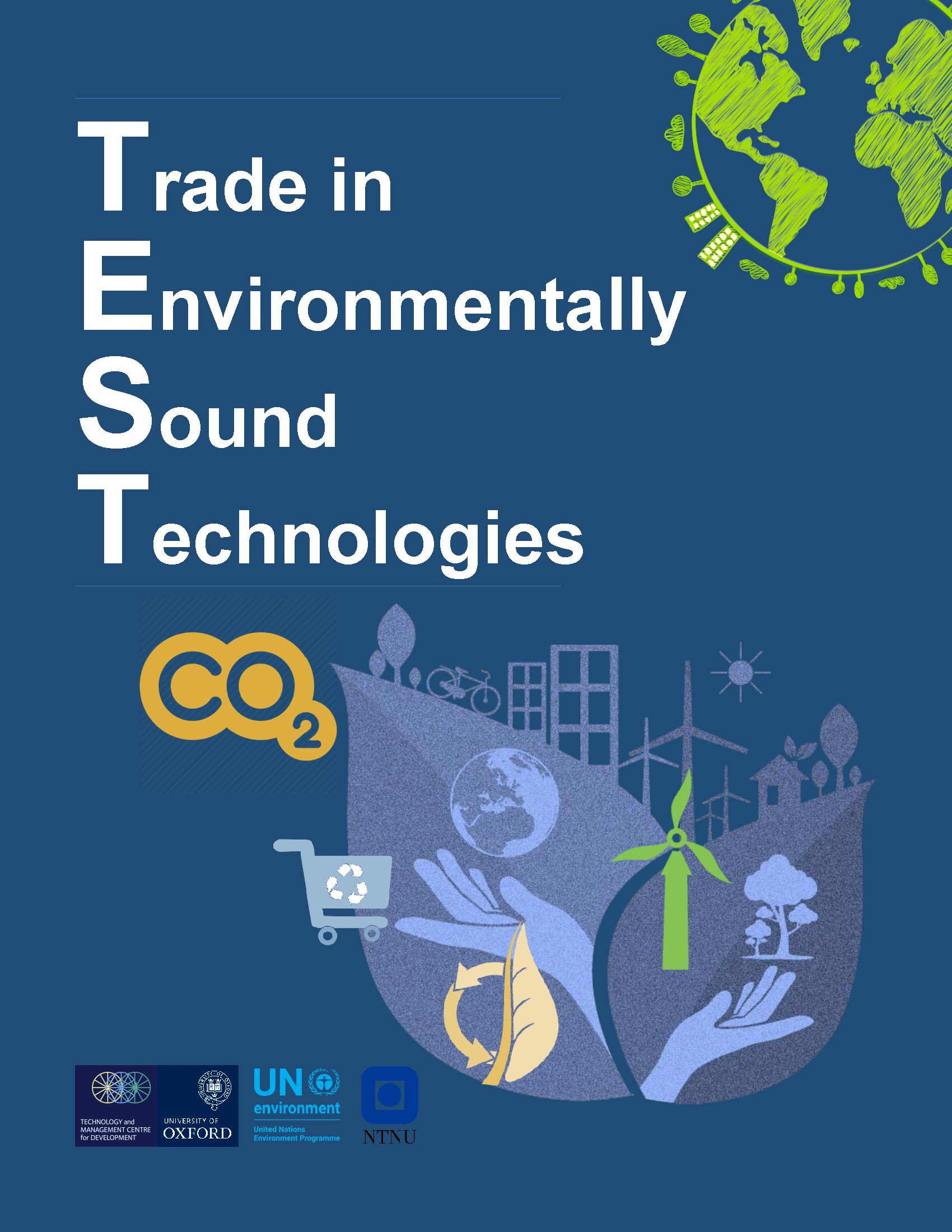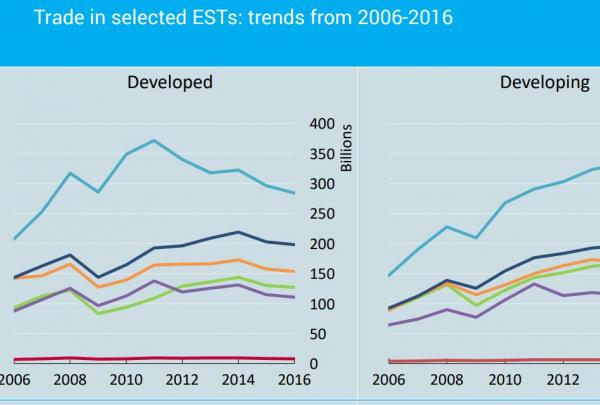TEST Project

Background
In recent years, the nexus of technology and trade has gained increasing importance at the global-level. At the level of global policy, several developments in recent years have changed the framework for trade in clean technologies. Alongside the 2030 Agenda for Sustainable Development and the Sustainable Development Goals (SDGs), the corresponding Addis Ababa Action Agenda on Financing for Development and the Paris Agreement on Climate Change play a key role in shaping the technology-trade nexus.
In the context of the 2030 Agenda for Sustainable Development and its SDGs, trade and technology serve as key means of implementation to address global issues, including climate change. Implementation of the goals and targets presents an opportunity to shape national and economic development strategies, plans, policies and actions by governments, civil society and international organizations towards greater sustainability. While the nexus technology and trade cuts across several SDGs and their targets, trade is most visibly addressed in Goal 17 (Strengthen the Means of Implementation and Revitalize the Global Partnership for Sustainable Development), and technology in Goals 7 (Ensure Access to Affordable, Reliable, Sustainable and Modern Energy for All, via technological upgrades) and 9 (Build Resilient Infrastructure, Promote Sustainable Industrialization and Foster Innovation).
Despite the strong impetus, little progress has been made so far in the area of trade liberalization in environmentally sound technologies (ESTs). Obstacles include the lack of a commonly agreed definition and diverging country priorities, e.g. due to varying stages of development. Despite these obstacles, developing countries have been playing an increasing role in the transition to a greener economy. Integration of developing countries into global production and trade of ESTs can help to secure affordable, clean energy and green global value chains, all the while creating employment and addressing environmental challenges such as climate change and pollution.
This project will directly contribute to the United Nations(UN) Environment Project, aiming to stimulate trade related measures and policy initiatives that promote the objectives of an inclusive green economy, by building capacities, providing knowledge products and advisory services to countries. The activities of this project will support and enable developing countries to objectively assess and understand the opportunities, benefits and challenges of liberalized trade in EST and thus contributes to implementation of climate goals and SDGs related to trade, energy, technology and climate change.
What is the aim of the project?
With this project, Technology and Management Centre for Development (TMCD), UN Environment and Norwegian University of Technology and Science (NTNU) aim to build global understanding on implications, capacity needs and enabling conditions for trade liberalization in environmentally sound technologies and thereby contribute towards sustainable, environmentally credible and inclusive value chain integration and trade in technologies, by providing support to developing countries to objectively assess and understand the opportunities, benefits and challenges of liberalized trade in environmentally sound technologies.
A key component of this project is a global study, which will outline the history, context and status quo of international and regional negotiations on trade in environmentally sound technologies, explain the modalities of trade liberalization and implementation, and define key related concepts. On the basis of this conceptual foundation, the analysis will zoom in on developing country participation in trade in selected environmentally sound technologies, identify opportunities and key challenges, and highlight potential capacity needs. Building on this, it will provide recommendations for harnessing opportunities and addressing risks.
What are environmentally sound technologies?
The environmental goods and services industry consists of activities which produce goods and services to measure, prevent, limit, minimize or correct environmental damage to water, air and soil, as well as problems related to waste, noise and eco-systems. This includes cleaner technologies, products and services that reduce environmental risk and minimize pollution and resource use.
Clean technologies, also referred to as environmentally sound technologies, are technologies that have the potential for significantly improved environmental performance relative to other technologies. Environmentally sound technologies are not just individual technologies, bur can also be defined as total systems that include know-how, procedures, goods and services, and equipment, as well as organizational and managerial procedures for promoting environmental sustainability.
Who is working on this project?
Technology & Management Centre for Development (TMCD) – University of Oxford
The TMCD of Oxford University is a world leading research centre focusing on some of the most important issues related to technology and development facing public and private policymakers today. It has long standing reputation for world class research on innovation, technology and development, and as well as trade, foreign direct investment and economic development in the developing world. The centre has also developed research in the area of policy and management of innovation and green technology transformation and the role of trade and Foreign Direct Investment in facilitating international technology transfer in green technology.
Professor Xiaolan Fu is the Founding Director of the Technology and Management Centre for Development (TMCD), Professor of Technology and International Development and Fellow of Green Templeton College. She was appointed by the Secretary-General of the United Nations to the Ten-Member High Level Advisory Group of the UN Technology Facilitation Mechanism and to the Governing Council of the UN's Technology Bank for Least Developed Countries. She is also a member of the UN SDSN Leadership Council led by Jeffrey Sachs and a member of the Adivisory Board of UNU-MERIT.
In this project, Professor Fu is supported by Dr Laura Rival, Dr Shaomeng Li and Dr Giovanni Pasquali.
Environment and Trade Hub – UN Environment
As the leading global environmental authority, UN Environment has the mandate of delivering on the environmental dimension of sustainable development. Its experience in environment and trade issues, together with its collaboration with key trade organisations such as the World Trade Organization will help to provide new leadership on global governance of environment and trade.
To support countries in using trade to achieve climate goals and the Sustainable Development Goals, UN Environment launched the Environment and Trade Hub in 2015. Since then, the Hub has been working with a number of public and private partners on knowledge and capacity building in more than 20 countries, developing tools and methodologies on trade and environment nexus, while promoting international cooperation and shaping the global agenda on environment and trade through its role as a convener and facilitator.
The project is lead by Anja von Moltke, Head of the Environment and Trade Hub, and Ying Zhang, project manager at UN Environment.
Norwegian University of Technology and Science (NTNU)
NTNU has an international focus and great academic breadth that also includes the humanities, social sciences, economics, and entrepreneurship, among others. NTNU’s strategic areas of research for 2014–2023 include sustainability, energy, oceans, and health.
The project is supported by John Eilif Hermanson, Associate Professor at the Department of Industrial Economics and Technology Management and Haley Knudson, PhD Candidate at the Department of International Business Faculty of Economics and Management.
Independent Consultants
The project is further supported by Mahesh Sugathan, Dr Anirudh Shingal and Kerstin Wonka.

The TMCD has released a report on trade in environmentally sound technologies alongside its research partners, UN Environment’s Environment and Trade Hub and the Department of Industrial Economics and Technology Management at the Norwegian University of Science and Technology.
Events
- UNEP, 2019: Trade in clean technologies offers opportunities in economic development, job creation and innovation
Further Resources
- UNEP & WTO, 2009: Trade and Climate Change
- UNEP, 2014: Green Economy and Trade Handbook (in English, Chinese, French, Spanish and Russian)
- UNEP, 2014: South-South Trade in Renewable Energy: A Trade Flow Analysis of Selected Environmental Goods
- NTNU, 2015: An Evaluation of Environmental Goods (EGs) for the WTO EGA: EGs for Developing Countries
- UNEP, 2016: Intra-ASEAN Value Chain Cooperation and Trade in Environmentally Sound Technologies
- UNEP, 2016: Green Economy-Trade Opportunities Project: Ghana Strategy Proposal - Realizing solar PV projects in a cross-border power supply context
- UNEP, 2017: Green Industrial Policy & Trade: A Tool Box
- UNEP & IISD, 2017: Sustainability Toolkit for Trade Negotiators
- Mapping of Trade in Environmental Goods
Relevant Links
- Environment and Trade Hub – UN Environment
- Overarching project on Trade in Environmentally Sound Technologies by UN Environment
- The Third United Nations Environment Assembly (UNEA)
- Resolution on “Investing in innovative environmental solutions for accelerating the implementation of the Sustainable Development Goals”
- Climate Technology Centre and Network
- Climate and Clean Air Coalition
- Asia-Pacific Research and Training Network on Trade
- UN Environment Regional Office for Asia Pacific
- UN Environment Regional Office for Africa
- UN Environment Energy
- UN Environment International Environmental Technology Centre
This project is supported by the European Commission through the Global Public Goods and Challenges (GPGC) programme.



